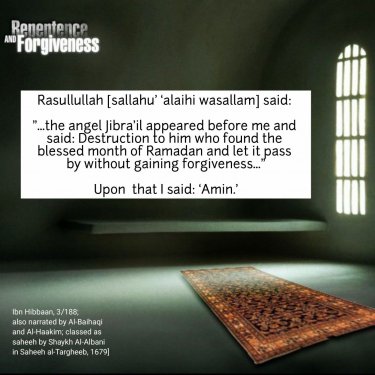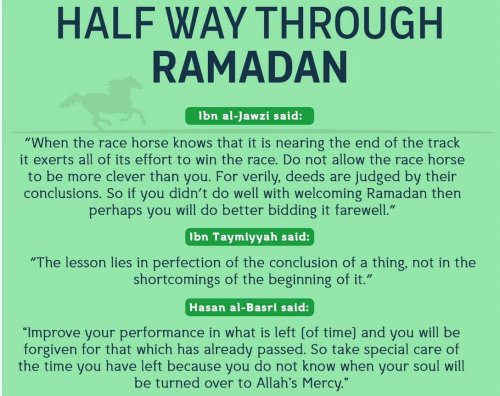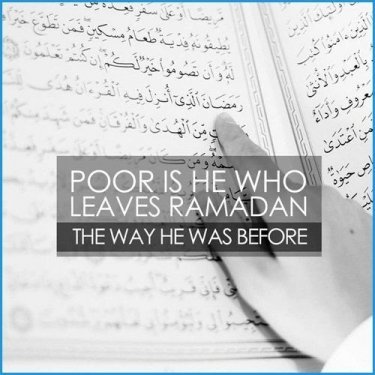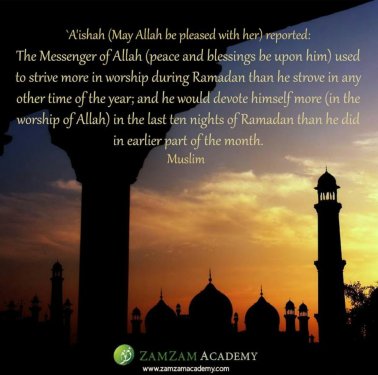-
Posts
1,751 -
Joined
-
Last visited
-
Days Won
106
Content Type
Profiles
Forums
Events
Everything posted by Bint e Aisha
-
Striving in the path of Allah leads to taraqi/spiritual progress. When a father intends to gift his toddler a sweet, sometimes, he will hold it tightly in his fist. He will instruct the child that if you want it, open my fingers and take it! This child will pull and twist his fingers, trying his hardest to grab the sweets. It gives the father joy watching his efforts, so he holds on even tighter. Of course he plans to give it eventually, maybe even more than just one sweet. But for that moment, he likes to watch his child try. Likewise, is our relationship with Allah. He does intend to give you and I the bounties of the heavens and the earth, but it doesn’t come at a cheap price. You have to strive and that is exactly what he wants to see. Sometimes when we go through a difficult phase, it is Allah’s silent way of telling us to turn to Him more. That is all. He wants to see effort and sacrifice. He wants us to prove that we really want His mercy, closeness and grace. Once we do that, in a short while he will open the door to his endless bounties. — Hazrat Ml. Dawood Seedat حفظه الله Above is an article taken from www.islaahiadvices.com. It is an extract from Hazrat’s talk on 7/3/2016 in Masjid-ut-Taqwa, Pietermaritzburg. To listen to the full audio, please Click here.
-
-
An Effective Remedy for Ghaflah (being heedless of Allah) - Maulana Hakeem Akhtar D.B. If the nafs (ego) is not rectified and is lazy in performance of religious duties like Salah and fasting, etc, then one should meditate upon death. One should meditate upon the fact that one day he will be laying in the grave. What answer will one give to Allah Ta’ala at that time? The person whose heart has become hard and has become habituated to committing sins should meditate upon death for 4 to 5 minutes daily. He should meditate (Say to himself): “I have just died and after washing and shrouding my life-less body, the people are taking me to the graveyard and burying my lifeless corpse in the grave alone. My wife, children, business and home all have left me, and now, none of these things are of any benefit to me. Only my actions have remained.” Death is a reality, it is definite, and how can there be any doubt about a thing which is definitely going to occur? Death is such a reality that even the kuffar (disbelievers) do not deny. Has any kafir (disbeliever) said that death will not come? Therefore, ponder over the reason for us not performing Salah, and not paying the Zakah. What is the reason for us watching T.V. and V.C.R? What is the reason that we are involved in these evil actions? The reason is to pass time and entertain ourselves. But ponder over the fact that when we are lowered into the grave, what will enter the grave with us? What will we entertain ourselves with then? How many T.V.’s and V.C.R.’s will we take with us? There will be no V.C.R in the grave, rather there will be punishment. Therefore, wake up from this heedlessness and do not entertain yourself with the disobedience of Allah Ta‘ala. "That slave who pleases his heart at the cost of displeasing his Master is in total loss"!: Just the following statement is sufficient for the guidance of someone, ‘The slave who pleases his own heart (by living a life of disobedience) at the cost of displeasing his Master, is in total loss.’ i.e. at any time the punishment of Allah Ta’ala could descend upon him. Allah Ta’ala is giving us chance after chance in hope that we will rectify ourselves. Nabi (saw) says, “Remembrance of death is a sufficient lecturer and preacher.” It is sufficient for guidance. It recharges one’s spiritual battery. {In another hadith it is mentioned, “Keep much the remembrance of death, which is the destroyer of pleasures.” [Tirmidhi] } One should also sit in pious company. Wherever there is any beneficial Deeni talk, then go there. Look! How far our pious predecessors used to travel to learn Deen! http://tazkiyatips.blogspot.com/2013/05/an-effective-remedy-for-ghaflah-being.html?m=1
-
- ghaflah
- negligence
-
(and 1 more)
Tagged with:
-
-

Tips to wake up for Fajr Salah
Bint e Aisha replied to Bint e Aisha's topic in General Islamic Discussions
-
The importance of reciting Qur’aan Shareef daily at home by Mufti Ebrahim Salejee (Madrasah Taleemuddeen) It is necessary for every home to introduce the recitation of the Qur’aan every day. There was a time when every morning and evening, every Muslim home would be buzzing with the recitation of Qur’aan. Men, women and children would all be engaged in tilaawah. This brings about immense barakah into our homes and protects ones home from many evils and wrongs. Below are three immediate benefits of reciting the Qur’aan which are mentioned in the Noble Ahaadeeth of Rasoolullah Sallallahu Alayhi wa Sallam: 1. Protects one from kufr: The members of that home wherein the Qur’aan is recited is protected from kufr and shirk. (this has been explained in detail by Hadhrat Mufti Muhammad Shafee Saahib (RA) in Ma’ariful Qur’aan Vol.5 Pg.20) 2. Protects one from fitnah: Sayyiduna Ibn Abaas Radhiyallahu Anhu has reported that Jibreel Alayhi Salam once told Rasoolullah Sallallahu Alayhi wa Sallam that many fitnahs will appear. Rasoolullah Sallallahu Alayhi wa Sallam asked, “What will be the way out, O Jibreel?” He replied, “The Book of Allah.” Sheikh ul Hadeeth, Moulana Muhammad Zakariyyah Kaandhlawi (RA) comments on this Hadeeth, “Reciting the Qur’aan saves a person from fitnah. If the Qur’aan is recited in the home, peace and mercy descends on it and shaytaan leaves immediately. Sayyiduna Ali Radhiyallahu Anhu says that Yahyaa Alayhi Salam told the Bani Isra’eel, ‘Allah orders you to read His book and if you do so, you will be like a people protected in a fort. On whichever side the army wants to attack you from, they will find the Word of Allah Ta’aala there as a guard to chase them.’” 3. Protects one from Jinnaat and Sihr Sayyiduna Abdullah bin Abbaas Radhiyallahu Anhu narrated that Rasoolullah Sallallahu Alayhi wa Sallam said, “He in whose heart there is no part of the Qur’aan is like an empty house.” Sayyiduna Abu Hurairah Radhiyallahu Anhu says, “The house in which the Qur’aan is recited, it’s household members increase, virtues and barakah multiply, angels come down upon them and shaytaan runs far away from there but the house in which the Qur’aan is not recited, life therein becomes difficult and empty of barakah, angels leave the house and shaytaan lives in it.” Ibn Mas’ood and other Sahaabah Radhiyallahu Anhum have reported that Rasoolullah Sallallahu Alayhi wa Sallam said, "An empty house is one in which the Qur’aan is not recited.” Jamiatul Ulama (KZN)
-
Prevention of the Qur’an Someone asked sheikh Muhammad Mukhtar Shinqeeti; “Many days pass without me reading anything from the Quran. Is this considered hajr (boycotting) the Quran?” He said, “This is considered hirman (prevention), and what is prevention? It is when you find that many days pass you and you haven’t recited anything from the Quran. Then cry for yourself! For by Allah! A slave is not prevented from an act of obedience except that it is an indication of his distance from Allah. So when you find the days passing you by and Allah’s Book has no portion of it, or the hours of its nights and days, then cry for yourself and ask Allah for wellbeing (in eman), and throw yourself before Allah sincerely asking forgiveness, because that (condition) is not due to anything except a sin between you and Allah.” https://thekatibahwrites.wordpress.com/2017/06/18/prevention-of-the-quran/
-
Being in the habit of fasting after the fasts of Ramadhaan is a sign of acceptance of the Ramadhaan fasts. This is because when Allah Ta’ala accepts a deed from a servant, he enables him to follow it with a good deed. [Lataaiful Ma’araif, P. 452-3] Read more: http://daruliftaamw.com/the-six-fasts-of-shawwaal-equal-to-one-year/
-
- 1 reply
-
- 1
-

-
Question The six nafl fasts of the month of shawaal. If I intend to keep these fasts am I supposed to offer these fasts in a row (that is consequently) or can I take some gap in between, like one day I keep fast then after 2 or 3 days another fast like this. What is the fazilat of keeping these fasts. Answer Bismillahi Ta’ala, Assalamu Alaikum Warahmatullah, The six fasts of shawwal after Ramadhan are mustahab (preferable). Rasulullah salallahu alayhi wasallam has mentioned in one hadeeth that, “Whoever completes the fasts of Ramadhan then adds to them the fasts of six days in the month of Shawwal, it will carry the thawab of fasting for the whole year.” Saheeh Muslim Ulama have explained these rewards by saying that every good deed is rewarded with 10 hasanaat (rewards), hence fasting 30 days of month of Ramadhan will amount to 300 rewards (30 x 10). Thereafter if a person fasts an additional 6 fasts, then this will attain 60 rewards him (6 x 10). 300 rewards from Ramadhan plus the 60 rewards from shawal adds up to 360, which is the total number of days of a lunar year. Hence a person collects the reward of an entire year. While the virtue of these fasts may not be mere numbers, nontheless their certainty is not hidden. With regards to your question about keeping them consecutively or spaced out, then some Ulama have mentioned that it is better to offer them spaced out. This could be for different reasons. Some of them are: a. Since a person is already in a habbit of fasting for Ramadhan, he may trivialize these fasts and keep them just as a second nature instead of revering them. b. A person can arrange his fasts to match the mondays and thursdays and include the intention of sunnah fasts as well.This can become a motivation to keep sunnah fast all year round. c. Some people keep them right after Ramadhan from the following day of Eid. This tends to jeopardise people who wish to come and visit late for eid due to one reason or the other, and have to face the awkwardness of their host fasting. Alternatively, the host may end up breaking the fast for his guests. Either way the optimum will have to be compromised. However, if someone feels that they will not be able to keep the fasts if they separate them, or if they delay it after Eid they may end up not fasting at all, then there is nothing wrong in fasting these days consecutively right after Eid as well. Wallahu A’lam, Wassalamu `alaykum, Mufti Faisal al-Mahmudi www.fatwa.ca حدثنا يحيى بن أيوب، وقتيبة بن سعيد، وعلي بن حجر، جميعا عن إسماعيل، قال ابن أيوب: حدثنا إسماعيل بن جعفر، أخبرني سعد بن سعيد بن قيس، عن عمر بن ثابت بن الحارث الخزرجي، عن أبي أيوب الأنصاري رضي الله عنه، أنه حدثه، أن رسول الله صلى الله عليه وسلم قال: «من صام رمضان ثم أتبعه ستا من شوال، كان كصيام الدهر» صحيح مسلم (2/ 822))
-
Concluding Ramadan with Istighfar (Seeking Forgiveness) Hafiz Ibn Rajab (rahimahullah) said: Istighfar (seeking forgiveness) is the conclusion of all good actions, thus salah, hajj, standing in salah at night (qiyam al-layl) are all concluded with it. Gatherings are also concluded with it. If they are gatherings of knowledge, it serves as a seal for them, and if they are futile gatherings, it serves as a compensation. Likewise, the fasts of Ramadan should be concluded with Istighfar. Umar Ibn Abd al-Azeez (rahimahullah) sent a message to different cities, ordering the people to end Ramadan with Istighfar and charity, i.e., sadaqat al-fitr, because sadaqat al-fitr is a purification for the fasting person from vain and obscene talk. Furthermore, Istighfar repairs the damage caused to the fast through vain and obscene talk. This is why some of the previous scholars said sadaqat al-fitr for the one fasting is like sajdat al-sahw for salah." Lataa'if al-Ma'arif (pg. 383) May Allah Ta'ala forgive all our shortcomings during the month of Ramadan and accept all our good actions, through His grace and mercy. Aameen. @ShkhAbdulRaheem
-
“O Servants of Allah! Ramadan is set to move on, and only a little of it remains. If anyone has done well during the month thus far, it is incumbent on him to complete the month in a good fashion. While anyone who has fallen short let him finish in good shape. Only a few days and nights remain, so bid it farewell with righteous actions that will testify for you before the All-Knowing King. The hearts of the righteous people are filled with longing, lamenting from the pain of departure. How can a believer not shed tears upon its departure when he does not know if he will live to see it again? O Ramadan! Be gentle, the tears of your lovers are pouring out. Their hearts are torn from the pain of your departure. Perhaps standing to bid you farewell will extinguish the burning fire of longing. Perhaps taking a moment to repent will mend everything that has been torn in fast. Perhaps one cut off from the procession of those whose fast has been accepted will be joined with them. Perhaps the one imprisoned by his sins will be freed. Perhaps one deserving to be punished in Hell will be liberated. Perhaps the mercy of the Lord will be granted to the sinner.” Lataif Al Ma’arif of Ibn Rajab Al-Hanbali, Pg 216
-
-
Regret For Wasting Ramadan so far!!!Two thirds of Ramadan have passed and only one-third - the last blessed 10 days remains.Although we may all differ regarding the two thirds that have passed, there should be only one type of person in the remaining third: the person who is regretful of his negligence and conscious of his shortcomings.Regardless of one's eagerness to do good deeds, each one of us is guilty of negligence to a certain extent, and thus, we should be absolutely determined to make up for the time we have wasted and strive much harder from this moment onwards.--- So even though the first two thirds of Ramadan may have been wasted, we must not despair. Rather we should admit that we have been neglectful, wake ourselves up and internalise in our minds - that the final stretch of Ramadan will be not only better,but the best we have ever performed in any previous Ramadan - by the permission of Amighty Allah.We must act now!So we must now strive and work as hard as possible for we do not know if this will be our last Ramadan or not!Regardless of how sinful we are or whether we pray or even fast what matters is that we make a firm intention from this moment onwards that we will change for the better and repent for our past and present sins. These last 10 days and nights of this blessed month is the best opportunity for us to change our lives for the better in getting closer to Allah, connecting with the Qur'an and re-focusing our goals and objectives to that of preperation for the Hereafter! So let us not wait for tomorrow but act now in opening our hearts to Allah and crying and begging of him to forgive us and guide us to the straight path. We must strive from now on to better ourselves and to emulate the beloved Prophet (Sallallahu Alaihi Wasallam).So let us make firm intention right now that we will make every effort and do everything we can from now onwards to get closer to Allah and to spend every aspect of our lives in pleasing him and refraining from anything that may anger or displease him. For if we waste this valuable opportunity and die in this state then surely Allah will ask us that did we not get any opportunities to change? Did no one come to remind us? Did we not get chance after chance? Then how many more chances do we need until death takes us? Do we really know at which moment our death will be? Then surely the wise person acts immediately and does not delay!Utter regretTherefore we cannot afford to miss out on this most valuable opportunity as this may be our last Ramadan and our only opportunity to worship on Laylatul Qadr. If we lose this opportunity then surely we will be the biggest losers and in utter regret FOREVER!!! Source
-
ZAO List of Ibadaat in Odd Nights.pdf
- 1 reply
-
- 1
-

-
Sisters recite the Dua of Laylatul Qadr abundantly during the last 10 nights: اَللَّهُمَّ اِنَّكَ عَفُوٌّ ، تُحِبُّ الْعَفْوَ فَاعْفُ عَنِّي Allahumma innaka ‘affuwwun tuhibbul ‘afwa fa’fu ‘anni’ ‘O Allah You are The One Who forgives greatly, and loves to forgive, so forgive me. [at Tirmidhi]This Dua is a true blessing to our Ummah which was given to us by Allah the majestic to the Prophet [Sallallahu laihi Wasallam] to the most beloved person to him: Aisha [RA]. So that makes the Dua extra special. Normally when we ask for forgiveness then Allah may forgive us but may still mention the sin to us on the Day of Judgement. But in this Dua we are asking Allah to completely wipe away our sins so that they are totally erased. So recite this Dua frequently during this blessed night to get your sins totally wiped out and come out as sinless as a newborn baby. Subhanallah! Hamza Asadullah
-
Thank Allah abundantly even during periodsAlmighty Allah does not prevent a woman asking of him abundantly during her menses. He gives all of His sinful slaves a chance to earn multiple rewards, have their sins forgiven and their Dua's accepted. It is only He Who gave you a chance to do this. It is only He Who blessed you with the biggest blessing that could ever be. And that is the blessing of Islam. It is He Who made you Muslim, enabled you to live to witness Ramadan and Who give you the opportunity to worship Him. And even having your period is a reason for you to give thanks to Him.So give thanks to Him from the bottom of your heart, and show your gratitude to the one Who gave you all that you possess, for this season of goodness and blessing that He has bestowed upon you, and for all the bounties and immense blessings for which He has singled you out. Hamza Asadullah
-
I'tikaf for womenWomen can also do I'tikaf in the Masjid if the facilities are available to them as long as they have been given permission by their husbands. There is a difference of opinion whether or not a women can do I'tikaf at home. The Hanbalis, some Shafi's & some Malikis say that a woman can only sit I'tikaf at the Masjid, whereas the Hanafi's, some Shafi's & some Malikis say it is permissable for a women to do I'tikaf at a designated place in her home because if her prayer is prefferred at home then surely her I'tikaf should also be preferred at home. They state that a woman sitting I'tikaf at home can perform her domestic duties in her designated room for I'tikaf for eg. cooking, ironing etc. But it is best if she takes care of all her responsiblities si that she can devote as much time as possible to worship. She may not leave her desginated room unless it is necessery. The same rules apply to women sitting I'tikaf as they do for men. Even a women on her menses is permitted to sit I'tikaf at her designated place at home. She can do dhikr, dua, listening to Qur'an recitation & read, learn & ponder over the words & meanings of the Qur'an. Hamza Asadullah








.thumb.jpeg.c8c19d4d0028f9494286e7e1b9c57da8.jpeg)




